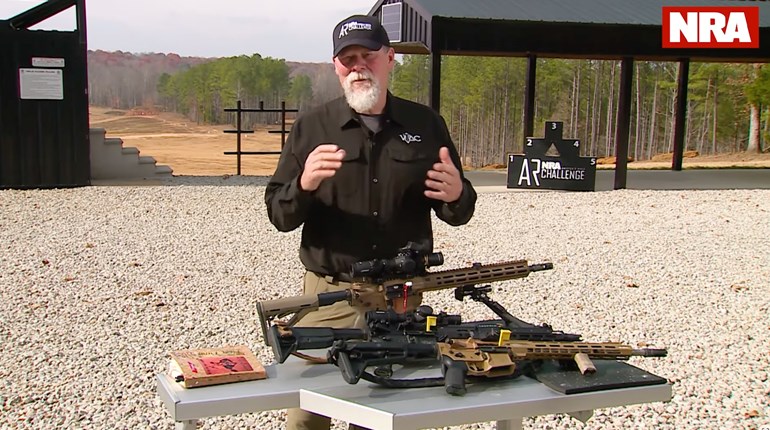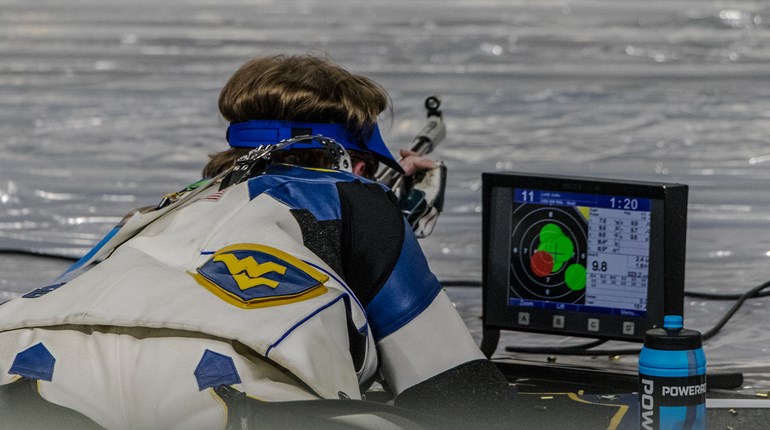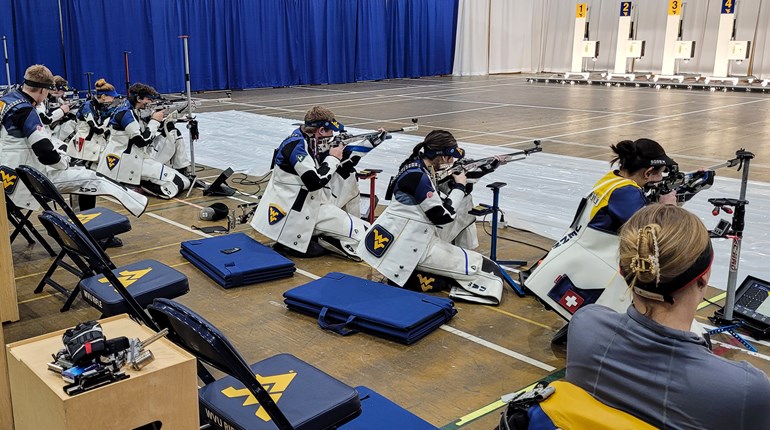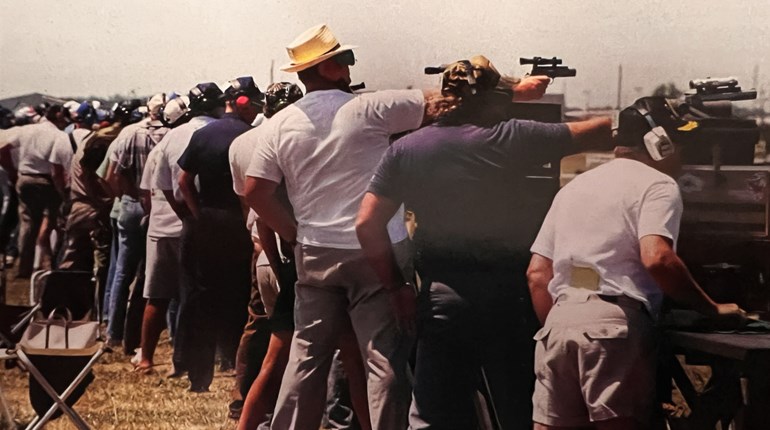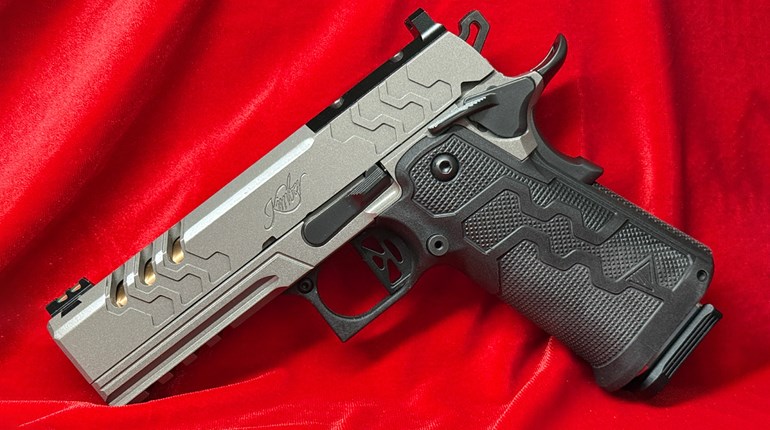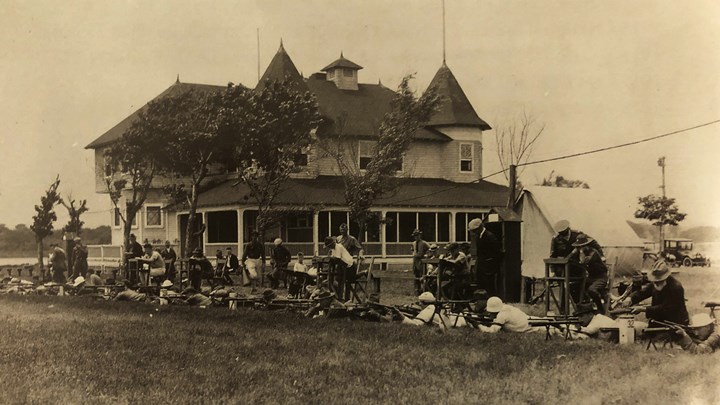
"After mature consideration the Secretary of War with regret announces the abandonment of the National Matches for this year."
—Army and Navy Journal, April 1912
At the NRA's January Annual Meeting, the decision was made to hold a national match with the site determined by a committee chaired by the Assistant Secretary of War. The NBPRP's subsequent meeting addressed the biennial format it had proposed two years earlier whereby National Matches would be held on alternate years so as not to clash with the Army's training schedule. The potential drawbacks of eliminating the annual match calendar and regionalizing the contests were also discussed, specifically that the level of interest might actually decline and states would not have the opportunity to compete against the regular service.
The Board concluded that despite the difficulties involved with scheduling its event in conflict with the Army's scheduled maneuvers on even years, the 1912 National Matches would indeed be held—at Sparta, Wisc. The change of venue was made, reported the Army and Navy Journal, since "the Ohio National Guard announced that Camp Perry was not a candidate for the match... The Camp Perry range will be gotten into condition for the great international shoot which is to be held in this country next summer... As the National Matches will also be held at Camp Perry next year there will be a larger gathering of crack shots on the range than has ever attended a match."
As it turned out, what was discussed in January didn't matter come March, when the Secretary of War announced that "owing to the demands upon the military establishment during the coming year it was necessary to abandon the holding of the National Matches for 1912." The Secretary made his decision primarily because the Army had its scheduled maneuvers, and the Texas delegation in Congress requested increased border forces due to strained relations between Mexico and the United States. As a result, the choice was made to devote energies involving the National Matches to the following year, when they would be held in conjunction with the International Matches of 1913.
NRA officials a year earlier had stated that if no National Matches were held, they would consider holding matches independently so as to perpetuate the trophies, or make arrangements to hold matches in connection with some State Association's program. And such was the case when Sea Girt was selected for the NRA Matches of 1912, which were held in conjunction with the matches of the New Jersey Rifle Association. Sea Girt was a familiar place with a familiar face, Gen. Bird W. Spencer, as the event's Executive Officer. Another feature of firing at Sea Girt this year was that the results from the Wimbledon, Leech and Marine Corps contests were included in the tryouts for the International Palma Match, which was fired the following week in Canada.
The President's Match was won by Corp. Cedric Long of Massachusetts and he received the traditional letter of congratulations from President William Howard Taft. The Cavalry Cup for the high cavalry finish in the President's Match was awarded to Capt. Morton C. Mumma, while the historic Wimbledon Cup went this year to Army Capt. A.L. Briggs. Additionally, the Leech Cup was awarded to Sgt. Frank H. Kean of Massachusetts.
The NRA's program included the following (winners in parentheses):
- Regimental Team Match (D.C. National Guard)
- Company Team Match (Co. "K," 1st Infantry, D.C. National Guard)
- Enlisted Men's Trophy Team Match (Massachusetts Volunteer Militia)
- Evan's Skirmish Match (U.S. Marine Corps)
- Wimbledon Cup Match (Capt. A.L. Briggs, USA)
- Leech Cup Match (Sgt. Frank H. Kean, Massachusetts)
- Marine Corps Cup Match (Capt. Guy Emerson, Ohio)
- President's Rifle Match (Corp. Cedric Long, Massachusetts)
Arms and the Man (predecessor publication to American Rifleman magazine), along with the NRA via its annual report, commented on the 1911 and 1912 events.
"Our annual matches for the first time in many years have resulted in a loss to the Association. If the War Department had not taken the attitude that they did and thrown cold water in every way upon our matches this year..."
—NRA 1912 Annual Report
"True there are larger and maybe more modern equipped ranges, but in the heart of every rifleman who has ever visited this grand old range, Sea Girt has a tender spot."
—Arms and the Man, September 1912
"A constant struggle must be made to avoid artificiality in rifle practice. If the National Matches and the annual events of the National Rifle Association are to be of continuing and increasing benefit as a means of increasing the effectiveness of small arms fire, more practical features similar to the Evans Service Skirmish Match, involving quick estimates of distance must be included...A line of spectators composed of contestants and bystanders followed the firers down the field in each run. There was even a carriage or two and an automobile. Mrs. Evans, wife of the Executive Officer, and Mrs. Butt, wife of Major Butt of the Executive Staff, were observed in a carriage which was never far from the line of crackling rifles from the first engagement to the last."
—Arms and the Man, August 1911

Photo: With no National Trophy Matches in 1912, the range at Sea Girt came back to prominence as the site for the NRA National Championships held that year. Supplanted by Camp Perry, New Jersey's Sea Girt nonetheless remained a much used target range—for the regional National Matches in 1914 and again in 1926 and 1932-1934. This photo is representative of the locale, with the firing line comfortably close to the clubhouse. The clothing and equipment date the photo as having been taken prior to 1908.
Read more: Excitement Reaches Fever Pitch: 1910 National Matches













